ESP in Legal Profession: Course Design, Needs & Strategies
VerifiedAdded on 2023/06/12
|19
|5022
|257
Essay
AI Summary
This essay provides a detailed analysis of English for Specific Purposes (ESP) course design within the legal profession, focusing on the needs of graduate law students in an advanced college institution. It explores strategies for needs analysis, including individual perspectives, group participation, and analysis of structured knowledge, particularly reading skills. The essay addresses the challenges faced by both native and non-native English speakers, emphasizing the importance of critical thinking, effective communication, and professional writing skills. It also discusses the role of social interaction, textual analysis, and research in enhancing learning, as well as the significance of pre-reading activities and reflection in knowledge acquisition. The analysis highlights the necessity of aligning course objectives with the demands of the global legal market, ensuring that students develop the language competencies required for success in their professional careers. This document is contributed by a student and Desklib provides access to similar assignments and study resources.

Task 1
ESP in the Legal profession
Name
Course
ESP in the Legal profession
Name
Course
Paraphrase This Document
Need a fresh take? Get an instant paraphrase of this document with our AI Paraphraser
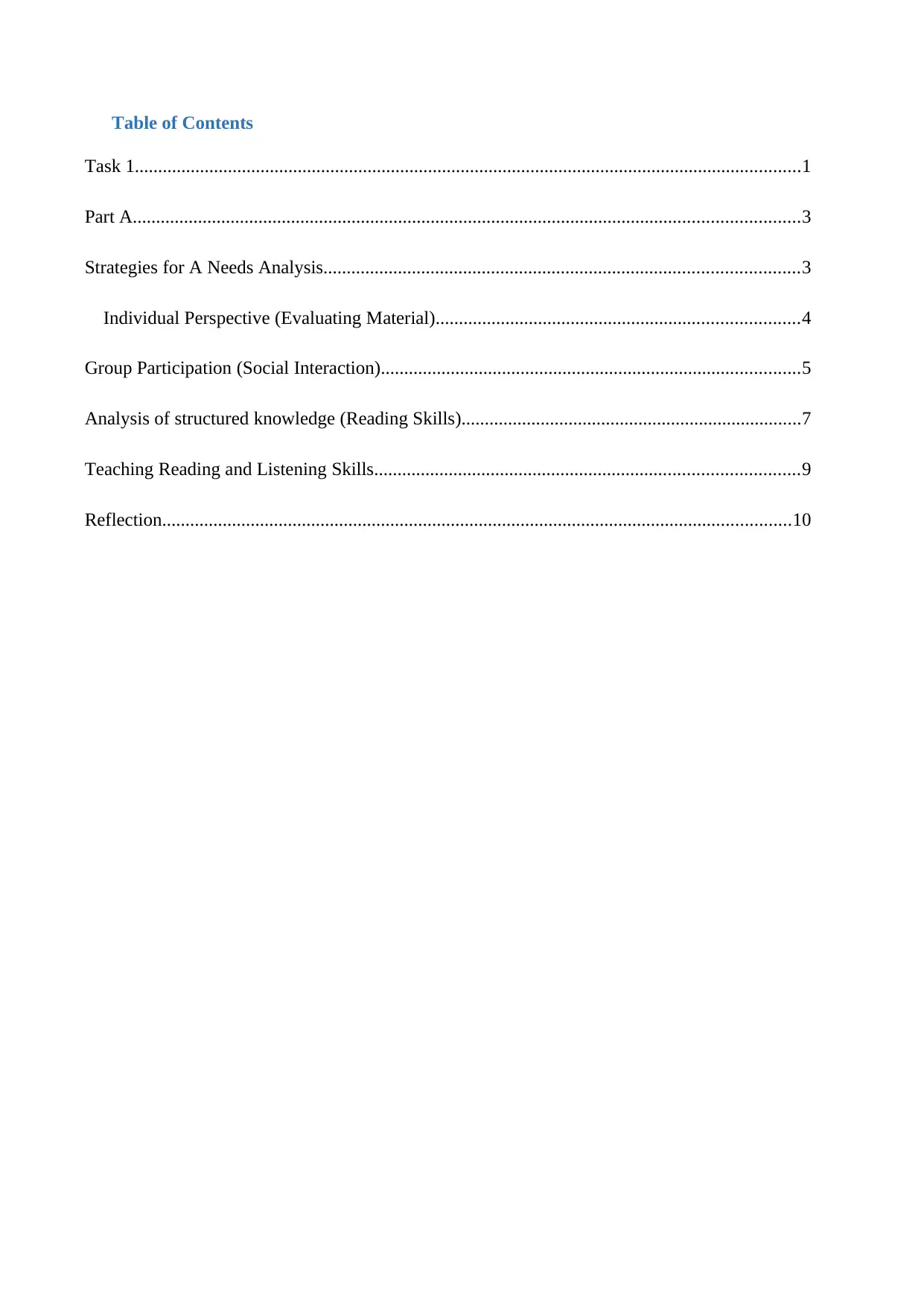
Table of Contents
Task 1...............................................................................................................................................1
Part A...............................................................................................................................................3
Strategies for A Needs Analysis......................................................................................................3
Individual Perspective (Evaluating Material)..............................................................................4
Group Participation (Social Interaction)..........................................................................................5
Analysis of structured knowledge (Reading Skills).........................................................................7
Teaching Reading and Listening Skills...........................................................................................9
Reflection.......................................................................................................................................10
Task 1...............................................................................................................................................1
Part A...............................................................................................................................................3
Strategies for A Needs Analysis......................................................................................................3
Individual Perspective (Evaluating Material)..............................................................................4
Group Participation (Social Interaction)..........................................................................................5
Analysis of structured knowledge (Reading Skills).........................................................................7
Teaching Reading and Listening Skills...........................................................................................9
Reflection.......................................................................................................................................10
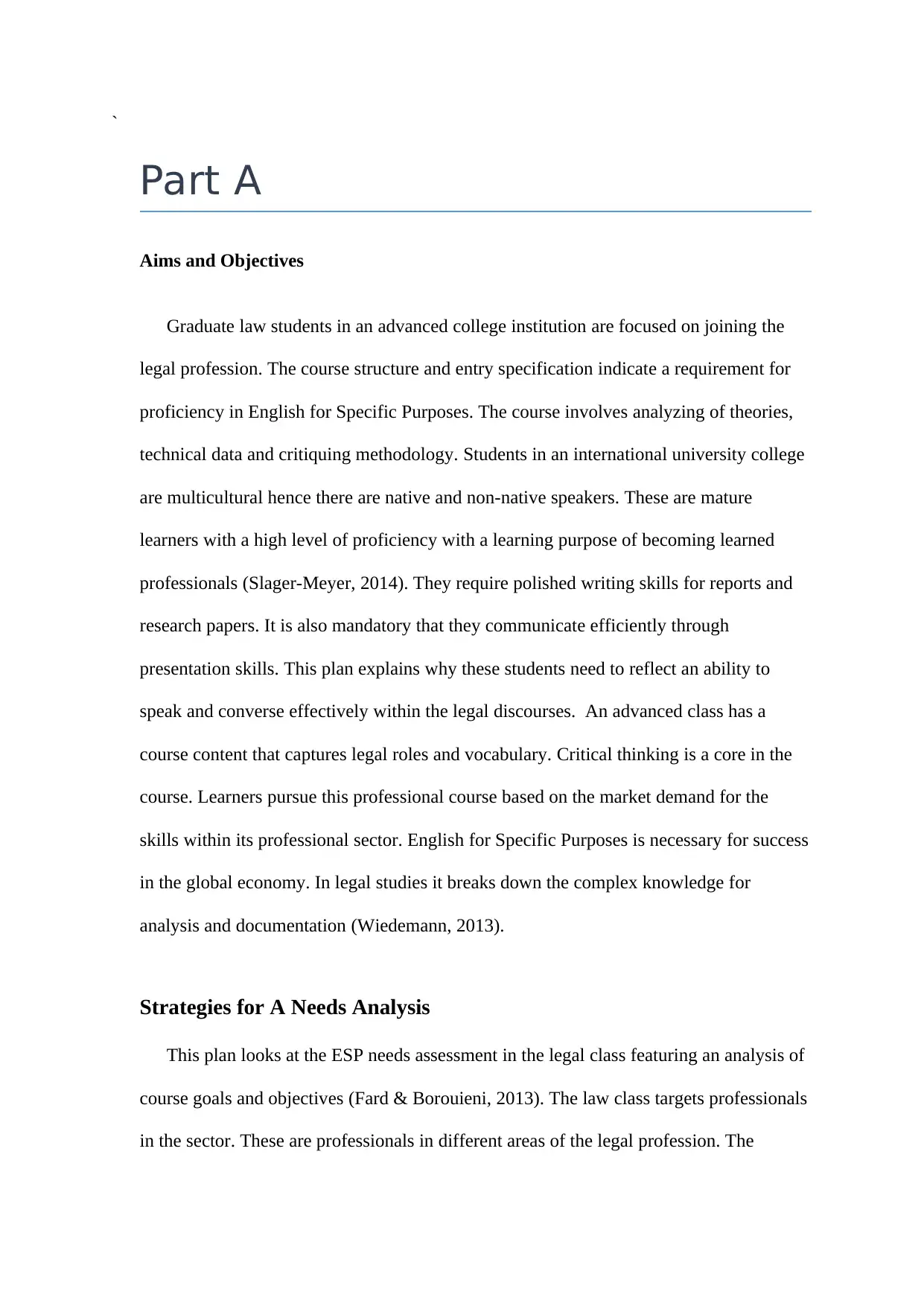
`
Part A
Aims and Objectives
Graduate law students in an advanced college institution are focused on joining the
legal profession. The course structure and entry specification indicate a requirement for
proficiency in English for Specific Purposes. The course involves analyzing of theories,
technical data and critiquing methodology. Students in an international university college
are multicultural hence there are native and non-native speakers. These are mature
learners with a high level of proficiency with a learning purpose of becoming learned
professionals (Slager-Meyer, 2014). They require polished writing skills for reports and
research papers. It is also mandatory that they communicate efficiently through
presentation skills. This plan explains why these students need to reflect an ability to
speak and converse effectively within the legal discourses. An advanced class has a
course content that captures legal roles and vocabulary. Critical thinking is a core in the
course. Learners pursue this professional course based on the market demand for the
skills within its professional sector. English for Specific Purposes is necessary for success
in the global economy. In legal studies it breaks down the complex knowledge for
analysis and documentation (Wiedemann, 2013).
Strategies for A Needs Analysis
This plan looks at the ESP needs assessment in the legal class featuring an analysis of
course goals and objectives (Fard & Borouieni, 2013). The law class targets professionals
in the sector. These are professionals in different areas of the legal profession. The
Part A
Aims and Objectives
Graduate law students in an advanced college institution are focused on joining the
legal profession. The course structure and entry specification indicate a requirement for
proficiency in English for Specific Purposes. The course involves analyzing of theories,
technical data and critiquing methodology. Students in an international university college
are multicultural hence there are native and non-native speakers. These are mature
learners with a high level of proficiency with a learning purpose of becoming learned
professionals (Slager-Meyer, 2014). They require polished writing skills for reports and
research papers. It is also mandatory that they communicate efficiently through
presentation skills. This plan explains why these students need to reflect an ability to
speak and converse effectively within the legal discourses. An advanced class has a
course content that captures legal roles and vocabulary. Critical thinking is a core in the
course. Learners pursue this professional course based on the market demand for the
skills within its professional sector. English for Specific Purposes is necessary for success
in the global economy. In legal studies it breaks down the complex knowledge for
analysis and documentation (Wiedemann, 2013).
Strategies for A Needs Analysis
This plan looks at the ESP needs assessment in the legal class featuring an analysis of
course goals and objectives (Fard & Borouieni, 2013). The law class targets professionals
in the sector. These are professionals in different areas of the legal profession. The
⊘ This is a preview!⊘
Do you want full access?
Subscribe today to unlock all pages.

Trusted by 1+ million students worldwide
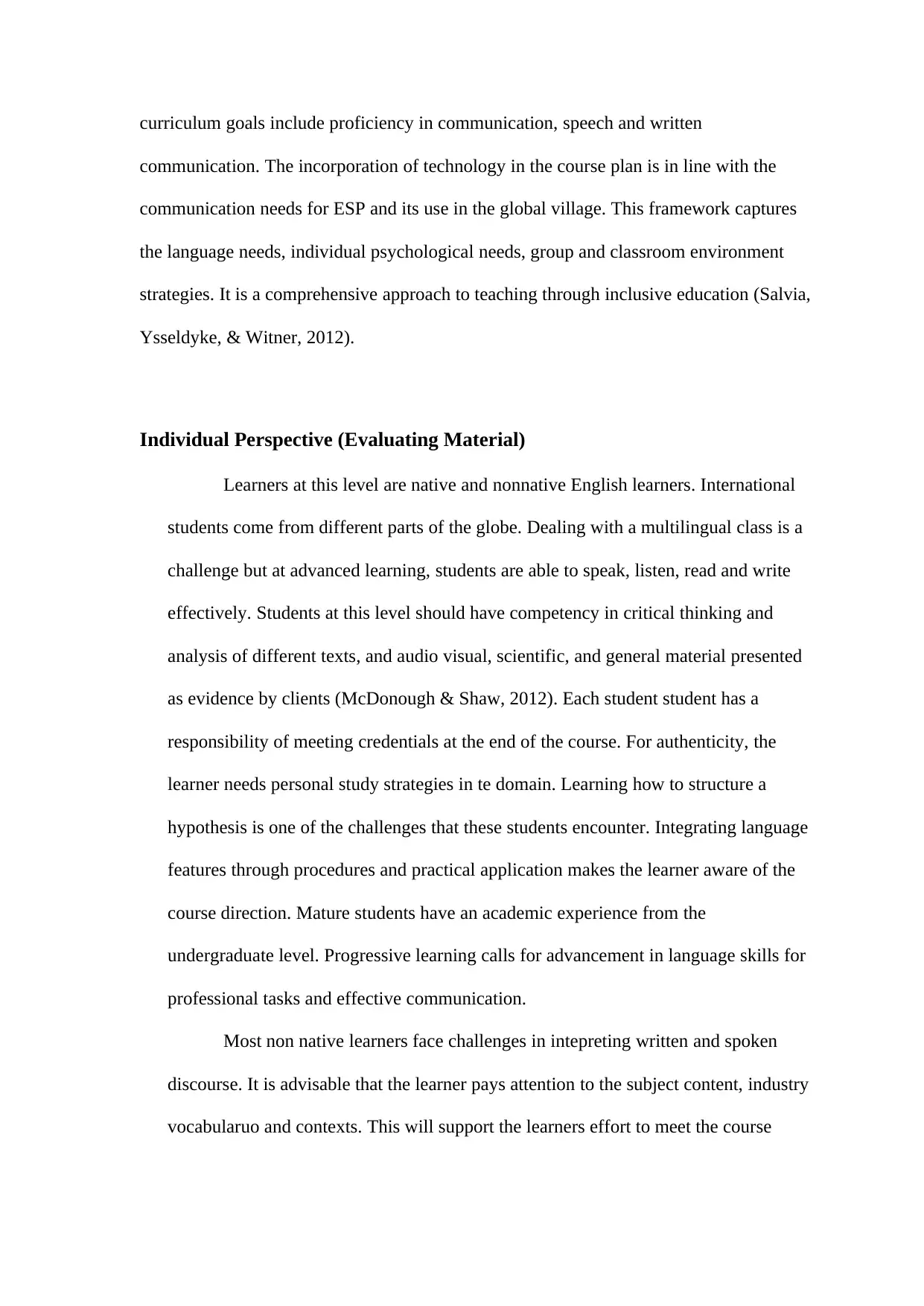
curriculum goals include proficiency in communication, speech and written
communication. The incorporation of technology in the course plan is in line with the
communication needs for ESP and its use in the global village. This framework captures
the language needs, individual psychological needs, group and classroom environment
strategies. It is a comprehensive approach to teaching through inclusive education (Salvia,
Ysseldyke, & Witner, 2012).
Individual Perspective (Evaluating Material)
Learners at this level are native and nonnative English learners. International
students come from different parts of the globe. Dealing with a multilingual class is a
challenge but at advanced learning, students are able to speak, listen, read and write
effectively. Students at this level should have competency in critical thinking and
analysis of different texts, and audio visual, scientific, and general material presented
as evidence by clients (McDonough & Shaw, 2012). Each student student has a
responsibility of meeting credentials at the end of the course. For authenticity, the
learner needs personal study strategies in te domain. Learning how to structure a
hypothesis is one of the challenges that these students encounter. Integrating language
features through procedures and practical application makes the learner aware of the
course direction. Mature students have an academic experience from the
undergraduate level. Progressive learning calls for advancement in language skills for
professional tasks and effective communication.
Most non native learners face challenges in intepreting written and spoken
discourse. It is advisable that the learner pays attention to the subject content, industry
vocabularuo and contexts. This will support the learners effort to meet the course
communication. The incorporation of technology in the course plan is in line with the
communication needs for ESP and its use in the global village. This framework captures
the language needs, individual psychological needs, group and classroom environment
strategies. It is a comprehensive approach to teaching through inclusive education (Salvia,
Ysseldyke, & Witner, 2012).
Individual Perspective (Evaluating Material)
Learners at this level are native and nonnative English learners. International
students come from different parts of the globe. Dealing with a multilingual class is a
challenge but at advanced learning, students are able to speak, listen, read and write
effectively. Students at this level should have competency in critical thinking and
analysis of different texts, and audio visual, scientific, and general material presented
as evidence by clients (McDonough & Shaw, 2012). Each student student has a
responsibility of meeting credentials at the end of the course. For authenticity, the
learner needs personal study strategies in te domain. Learning how to structure a
hypothesis is one of the challenges that these students encounter. Integrating language
features through procedures and practical application makes the learner aware of the
course direction. Mature students have an academic experience from the
undergraduate level. Progressive learning calls for advancement in language skills for
professional tasks and effective communication.
Most non native learners face challenges in intepreting written and spoken
discourse. It is advisable that the learner pays attention to the subject content, industry
vocabularuo and contexts. This will support the learners effort to meet the course
Paraphrase This Document
Need a fresh take? Get an instant paraphrase of this document with our AI Paraphraser
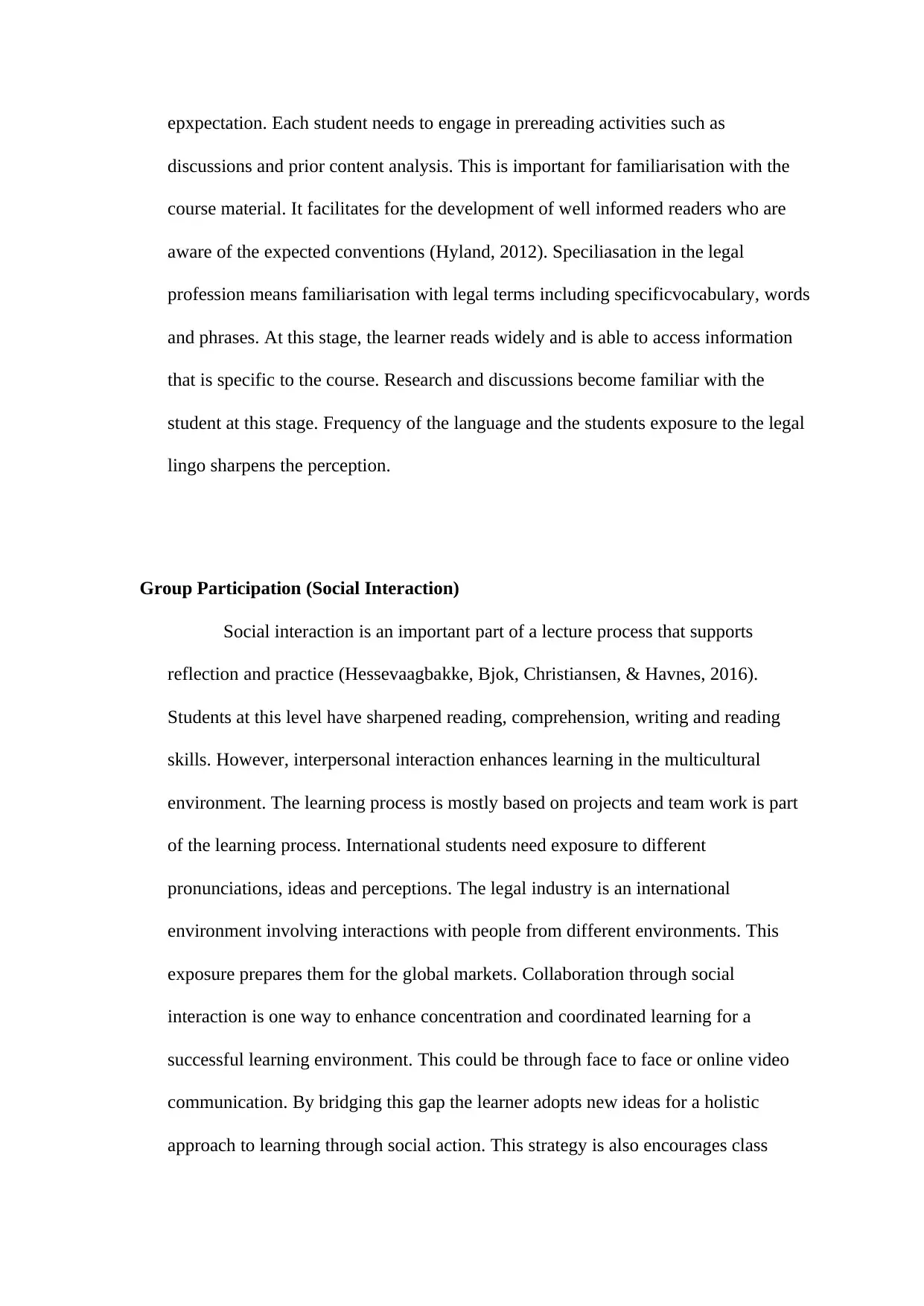
epxpectation. Each student needs to engage in prereading activities such as
discussions and prior content analysis. This is important for familiarisation with the
course material. It facilitates for the development of well informed readers who are
aware of the expected conventions (Hyland, 2012). Speciliasation in the legal
profession means familiarisation with legal terms including specificvocabulary, words
and phrases. At this stage, the learner reads widely and is able to access information
that is specific to the course. Research and discussions become familiar with the
student at this stage. Frequency of the language and the students exposure to the legal
lingo sharpens the perception.
Group Participation (Social Interaction)
Social interaction is an important part of a lecture process that supports
reflection and practice (Hessevaagbakke, Bjok, Christiansen, & Havnes, 2016).
Students at this level have sharpened reading, comprehension, writing and reading
skills. However, interpersonal interaction enhances learning in the multicultural
environment. The learning process is mostly based on projects and team work is part
of the learning process. International students need exposure to different
pronunciations, ideas and perceptions. The legal industry is an international
environment involving interactions with people from different environments. This
exposure prepares them for the global markets. Collaboration through social
interaction is one way to enhance concentration and coordinated learning for a
successful learning environment. This could be through face to face or online video
communication. By bridging this gap the learner adopts new ideas for a holistic
approach to learning through social action. This strategy is also encourages class
discussions and prior content analysis. This is important for familiarisation with the
course material. It facilitates for the development of well informed readers who are
aware of the expected conventions (Hyland, 2012). Speciliasation in the legal
profession means familiarisation with legal terms including specificvocabulary, words
and phrases. At this stage, the learner reads widely and is able to access information
that is specific to the course. Research and discussions become familiar with the
student at this stage. Frequency of the language and the students exposure to the legal
lingo sharpens the perception.
Group Participation (Social Interaction)
Social interaction is an important part of a lecture process that supports
reflection and practice (Hessevaagbakke, Bjok, Christiansen, & Havnes, 2016).
Students at this level have sharpened reading, comprehension, writing and reading
skills. However, interpersonal interaction enhances learning in the multicultural
environment. The learning process is mostly based on projects and team work is part
of the learning process. International students need exposure to different
pronunciations, ideas and perceptions. The legal industry is an international
environment involving interactions with people from different environments. This
exposure prepares them for the global markets. Collaboration through social
interaction is one way to enhance concentration and coordinated learning for a
successful learning environment. This could be through face to face or online video
communication. By bridging this gap the learner adopts new ideas for a holistic
approach to learning through social action. This strategy is also encourages class
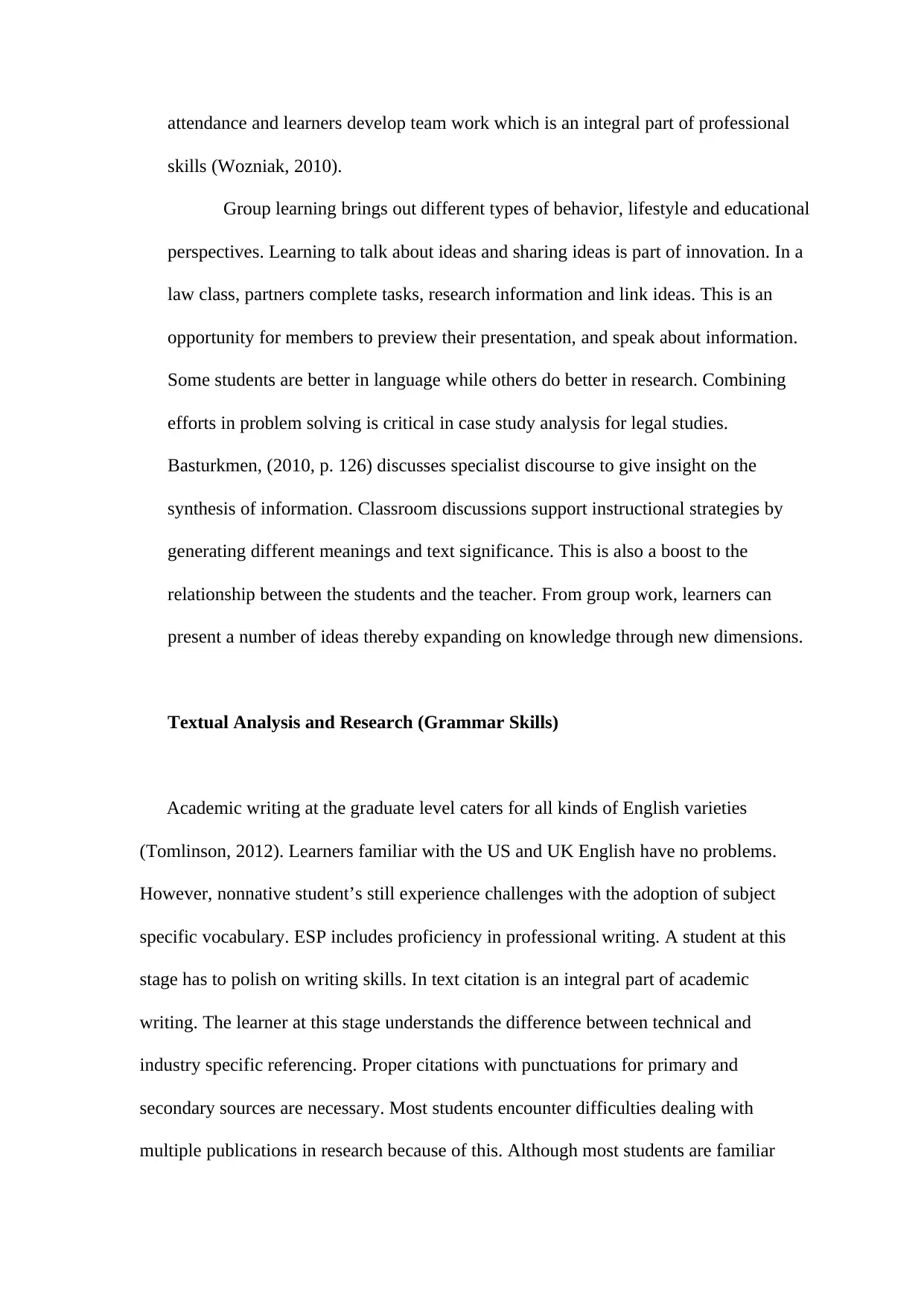
attendance and learners develop team work which is an integral part of professional
skills (Wozniak, 2010).
Group learning brings out different types of behavior, lifestyle and educational
perspectives. Learning to talk about ideas and sharing ideas is part of innovation. In a
law class, partners complete tasks, research information and link ideas. This is an
opportunity for members to preview their presentation, and speak about information.
Some students are better in language while others do better in research. Combining
efforts in problem solving is critical in case study analysis for legal studies.
Basturkmen, (2010, p. 126) discusses specialist discourse to give insight on the
synthesis of information. Classroom discussions support instructional strategies by
generating different meanings and text significance. This is also a boost to the
relationship between the students and the teacher. From group work, learners can
present a number of ideas thereby expanding on knowledge through new dimensions.
Textual Analysis and Research (Grammar Skills)
Academic writing at the graduate level caters for all kinds of English varieties
(Tomlinson, 2012). Learners familiar with the US and UK English have no problems.
However, nonnative student’s still experience challenges with the adoption of subject
specific vocabulary. ESP includes proficiency in professional writing. A student at this
stage has to polish on writing skills. In text citation is an integral part of academic
writing. The learner at this stage understands the difference between technical and
industry specific referencing. Proper citations with punctuations for primary and
secondary sources are necessary. Most students encounter difficulties dealing with
multiple publications in research because of this. Although most students are familiar
skills (Wozniak, 2010).
Group learning brings out different types of behavior, lifestyle and educational
perspectives. Learning to talk about ideas and sharing ideas is part of innovation. In a
law class, partners complete tasks, research information and link ideas. This is an
opportunity for members to preview their presentation, and speak about information.
Some students are better in language while others do better in research. Combining
efforts in problem solving is critical in case study analysis for legal studies.
Basturkmen, (2010, p. 126) discusses specialist discourse to give insight on the
synthesis of information. Classroom discussions support instructional strategies by
generating different meanings and text significance. This is also a boost to the
relationship between the students and the teacher. From group work, learners can
present a number of ideas thereby expanding on knowledge through new dimensions.
Textual Analysis and Research (Grammar Skills)
Academic writing at the graduate level caters for all kinds of English varieties
(Tomlinson, 2012). Learners familiar with the US and UK English have no problems.
However, nonnative student’s still experience challenges with the adoption of subject
specific vocabulary. ESP includes proficiency in professional writing. A student at this
stage has to polish on writing skills. In text citation is an integral part of academic
writing. The learner at this stage understands the difference between technical and
industry specific referencing. Proper citations with punctuations for primary and
secondary sources are necessary. Most students encounter difficulties dealing with
multiple publications in research because of this. Although most students are familiar
⊘ This is a preview!⊘
Do you want full access?
Subscribe today to unlock all pages.

Trusted by 1+ million students worldwide
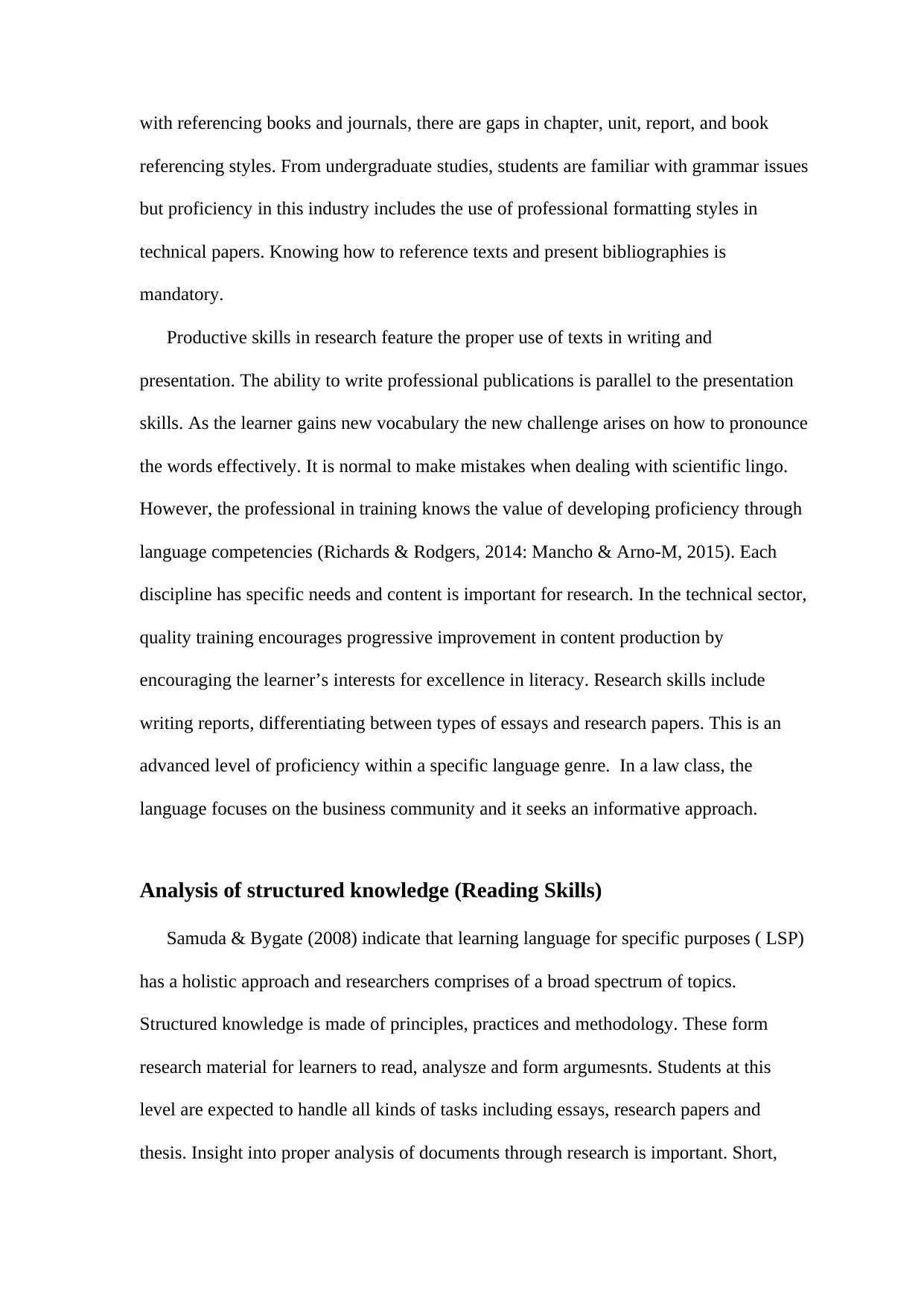
with referencing books and journals, there are gaps in chapter, unit, report, and book
referencing styles. From undergraduate studies, students are familiar with grammar issues
but proficiency in this industry includes the use of professional formatting styles in
technical papers. Knowing how to reference texts and present bibliographies is
mandatory.
Productive skills in research feature the proper use of texts in writing and
presentation. The ability to write professional publications is parallel to the presentation
skills. As the learner gains new vocabulary the new challenge arises on how to pronounce
the words effectively. It is normal to make mistakes when dealing with scientific lingo.
However, the professional in training knows the value of developing proficiency through
language competencies (Richards & Rodgers, 2014: Mancho & Arno-M, 2015). Each
discipline has specific needs and content is important for research. In the technical sector,
quality training encourages progressive improvement in content production by
encouraging the learner’s interests for excellence in literacy. Research skills include
writing reports, differentiating between types of essays and research papers. This is an
advanced level of proficiency within a specific language genre. In a law class, the
language focuses on the business community and it seeks an informative approach.
Analysis of structured knowledge (Reading Skills)
Samuda & Bygate (2008) indicate that learning language for specific purposes ( LSP)
has a holistic approach and researchers comprises of a broad spectrum of topics.
Structured knowledge is made of principles, practices and methodology. These form
research material for learners to read, analysze and form argumesnts. Students at this
level are expected to handle all kinds of tasks including essays, research papers and
thesis. Insight into proper analysis of documents through research is important. Short,
referencing styles. From undergraduate studies, students are familiar with grammar issues
but proficiency in this industry includes the use of professional formatting styles in
technical papers. Knowing how to reference texts and present bibliographies is
mandatory.
Productive skills in research feature the proper use of texts in writing and
presentation. The ability to write professional publications is parallel to the presentation
skills. As the learner gains new vocabulary the new challenge arises on how to pronounce
the words effectively. It is normal to make mistakes when dealing with scientific lingo.
However, the professional in training knows the value of developing proficiency through
language competencies (Richards & Rodgers, 2014: Mancho & Arno-M, 2015). Each
discipline has specific needs and content is important for research. In the technical sector,
quality training encourages progressive improvement in content production by
encouraging the learner’s interests for excellence in literacy. Research skills include
writing reports, differentiating between types of essays and research papers. This is an
advanced level of proficiency within a specific language genre. In a law class, the
language focuses on the business community and it seeks an informative approach.
Analysis of structured knowledge (Reading Skills)
Samuda & Bygate (2008) indicate that learning language for specific purposes ( LSP)
has a holistic approach and researchers comprises of a broad spectrum of topics.
Structured knowledge is made of principles, practices and methodology. These form
research material for learners to read, analysze and form argumesnts. Students at this
level are expected to handle all kinds of tasks including essays, research papers and
thesis. Insight into proper analysis of documents through research is important. Short,
Paraphrase This Document
Need a fresh take? Get an instant paraphrase of this document with our AI Paraphraser
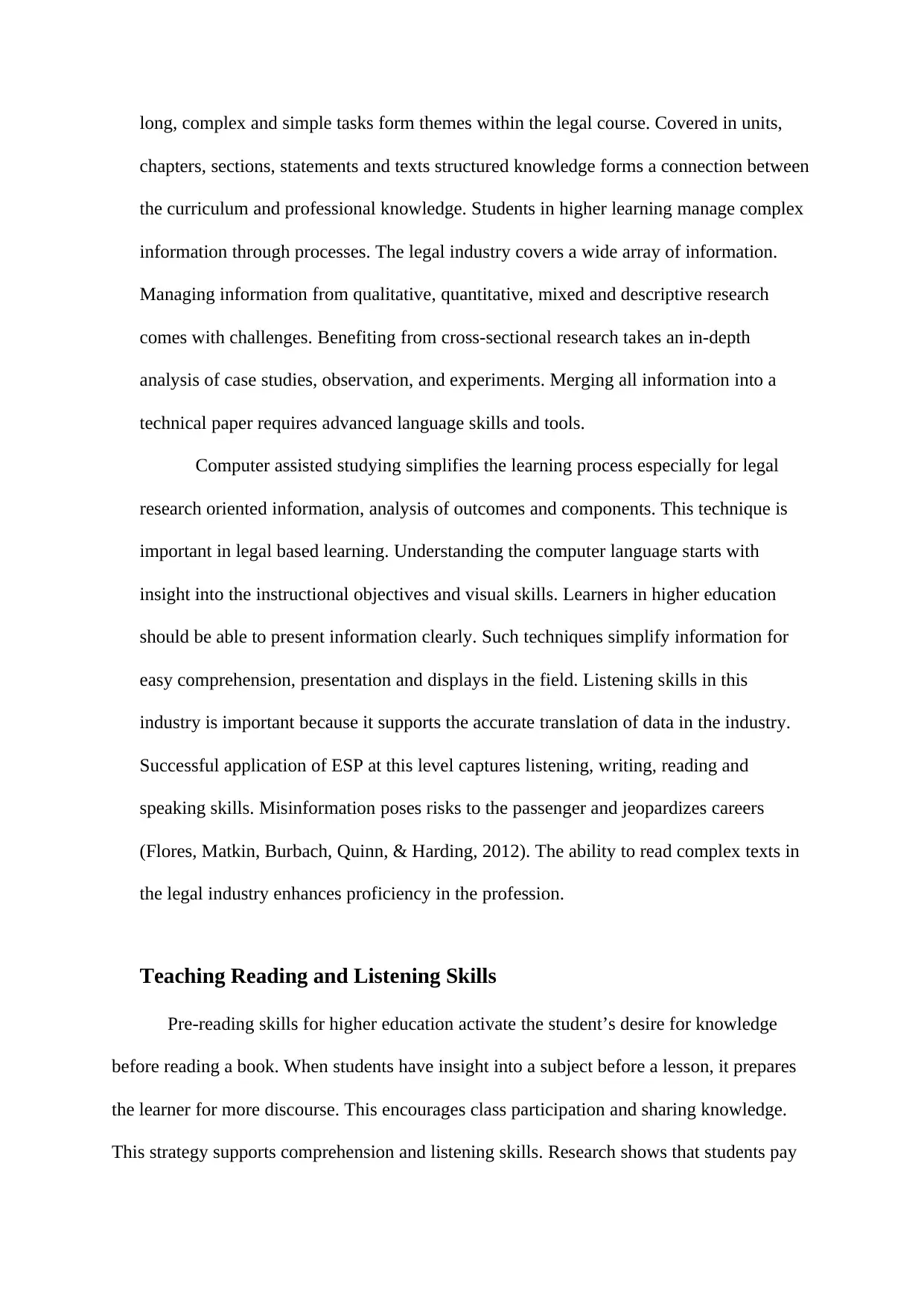
long, complex and simple tasks form themes within the legal course. Covered in units,
chapters, sections, statements and texts structured knowledge forms a connection between
the curriculum and professional knowledge. Students in higher learning manage complex
information through processes. The legal industry covers a wide array of information.
Managing information from qualitative, quantitative, mixed and descriptive research
comes with challenges. Benefiting from cross-sectional research takes an in-depth
analysis of case studies, observation, and experiments. Merging all information into a
technical paper requires advanced language skills and tools.
Computer assisted studying simplifies the learning process especially for legal
research oriented information, analysis of outcomes and components. This technique is
important in legal based learning. Understanding the computer language starts with
insight into the instructional objectives and visual skills. Learners in higher education
should be able to present information clearly. Such techniques simplify information for
easy comprehension, presentation and displays in the field. Listening skills in this
industry is important because it supports the accurate translation of data in the industry.
Successful application of ESP at this level captures listening, writing, reading and
speaking skills. Misinformation poses risks to the passenger and jeopardizes careers
(Flores, Matkin, Burbach, Quinn, & Harding, 2012). The ability to read complex texts in
the legal industry enhances proficiency in the profession.
Teaching Reading and Listening Skills
Pre-reading skills for higher education activate the student’s desire for knowledge
before reading a book. When students have insight into a subject before a lesson, it prepares
the learner for more discourse. This encourages class participation and sharing knowledge.
This strategy supports comprehension and listening skills. Research shows that students pay
chapters, sections, statements and texts structured knowledge forms a connection between
the curriculum and professional knowledge. Students in higher learning manage complex
information through processes. The legal industry covers a wide array of information.
Managing information from qualitative, quantitative, mixed and descriptive research
comes with challenges. Benefiting from cross-sectional research takes an in-depth
analysis of case studies, observation, and experiments. Merging all information into a
technical paper requires advanced language skills and tools.
Computer assisted studying simplifies the learning process especially for legal
research oriented information, analysis of outcomes and components. This technique is
important in legal based learning. Understanding the computer language starts with
insight into the instructional objectives and visual skills. Learners in higher education
should be able to present information clearly. Such techniques simplify information for
easy comprehension, presentation and displays in the field. Listening skills in this
industry is important because it supports the accurate translation of data in the industry.
Successful application of ESP at this level captures listening, writing, reading and
speaking skills. Misinformation poses risks to the passenger and jeopardizes careers
(Flores, Matkin, Burbach, Quinn, & Harding, 2012). The ability to read complex texts in
the legal industry enhances proficiency in the profession.
Teaching Reading and Listening Skills
Pre-reading skills for higher education activate the student’s desire for knowledge
before reading a book. When students have insight into a subject before a lesson, it prepares
the learner for more discourse. This encourages class participation and sharing knowledge.
This strategy supports comprehension and listening skills. Research shows that students pay
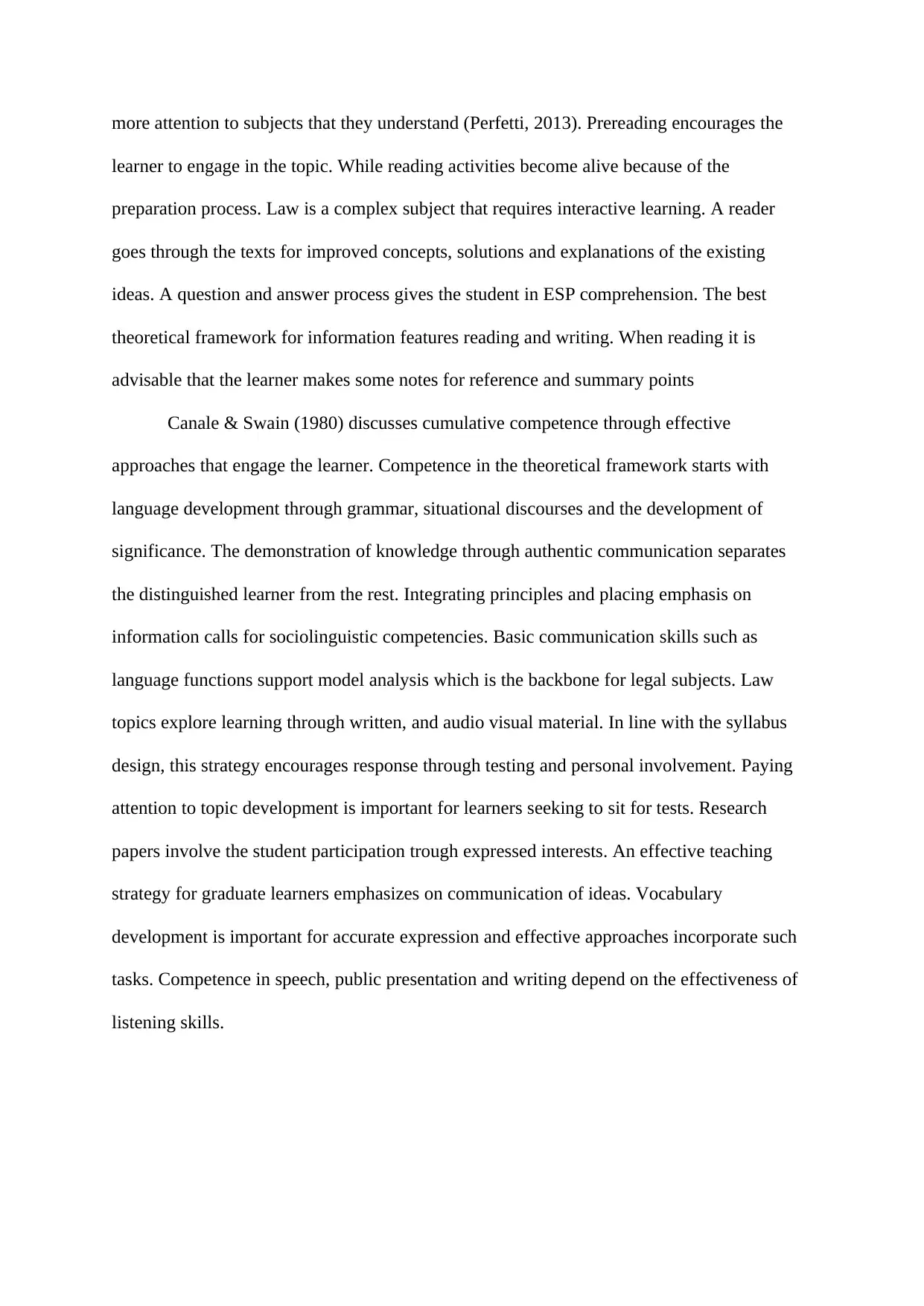
more attention to subjects that they understand (Perfetti, 2013). Prereading encourages the
learner to engage in the topic. While reading activities become alive because of the
preparation process. Law is a complex subject that requires interactive learning. A reader
goes through the texts for improved concepts, solutions and explanations of the existing
ideas. A question and answer process gives the student in ESP comprehension. The best
theoretical framework for information features reading and writing. When reading it is
advisable that the learner makes some notes for reference and summary points
Canale & Swain (1980) discusses cumulative competence through effective
approaches that engage the learner. Competence in the theoretical framework starts with
language development through grammar, situational discourses and the development of
significance. The demonstration of knowledge through authentic communication separates
the distinguished learner from the rest. Integrating principles and placing emphasis on
information calls for sociolinguistic competencies. Basic communication skills such as
language functions support model analysis which is the backbone for legal subjects. Law
topics explore learning through written, and audio visual material. In line with the syllabus
design, this strategy encourages response through testing and personal involvement. Paying
attention to topic development is important for learners seeking to sit for tests. Research
papers involve the student participation trough expressed interests. An effective teaching
strategy for graduate learners emphasizes on communication of ideas. Vocabulary
development is important for accurate expression and effective approaches incorporate such
tasks. Competence in speech, public presentation and writing depend on the effectiveness of
listening skills.
learner to engage in the topic. While reading activities become alive because of the
preparation process. Law is a complex subject that requires interactive learning. A reader
goes through the texts for improved concepts, solutions and explanations of the existing
ideas. A question and answer process gives the student in ESP comprehension. The best
theoretical framework for information features reading and writing. When reading it is
advisable that the learner makes some notes for reference and summary points
Canale & Swain (1980) discusses cumulative competence through effective
approaches that engage the learner. Competence in the theoretical framework starts with
language development through grammar, situational discourses and the development of
significance. The demonstration of knowledge through authentic communication separates
the distinguished learner from the rest. Integrating principles and placing emphasis on
information calls for sociolinguistic competencies. Basic communication skills such as
language functions support model analysis which is the backbone for legal subjects. Law
topics explore learning through written, and audio visual material. In line with the syllabus
design, this strategy encourages response through testing and personal involvement. Paying
attention to topic development is important for learners seeking to sit for tests. Research
papers involve the student participation trough expressed interests. An effective teaching
strategy for graduate learners emphasizes on communication of ideas. Vocabulary
development is important for accurate expression and effective approaches incorporate such
tasks. Competence in speech, public presentation and writing depend on the effectiveness of
listening skills.
⊘ This is a preview!⊘
Do you want full access?
Subscribe today to unlock all pages.

Trusted by 1+ million students worldwide
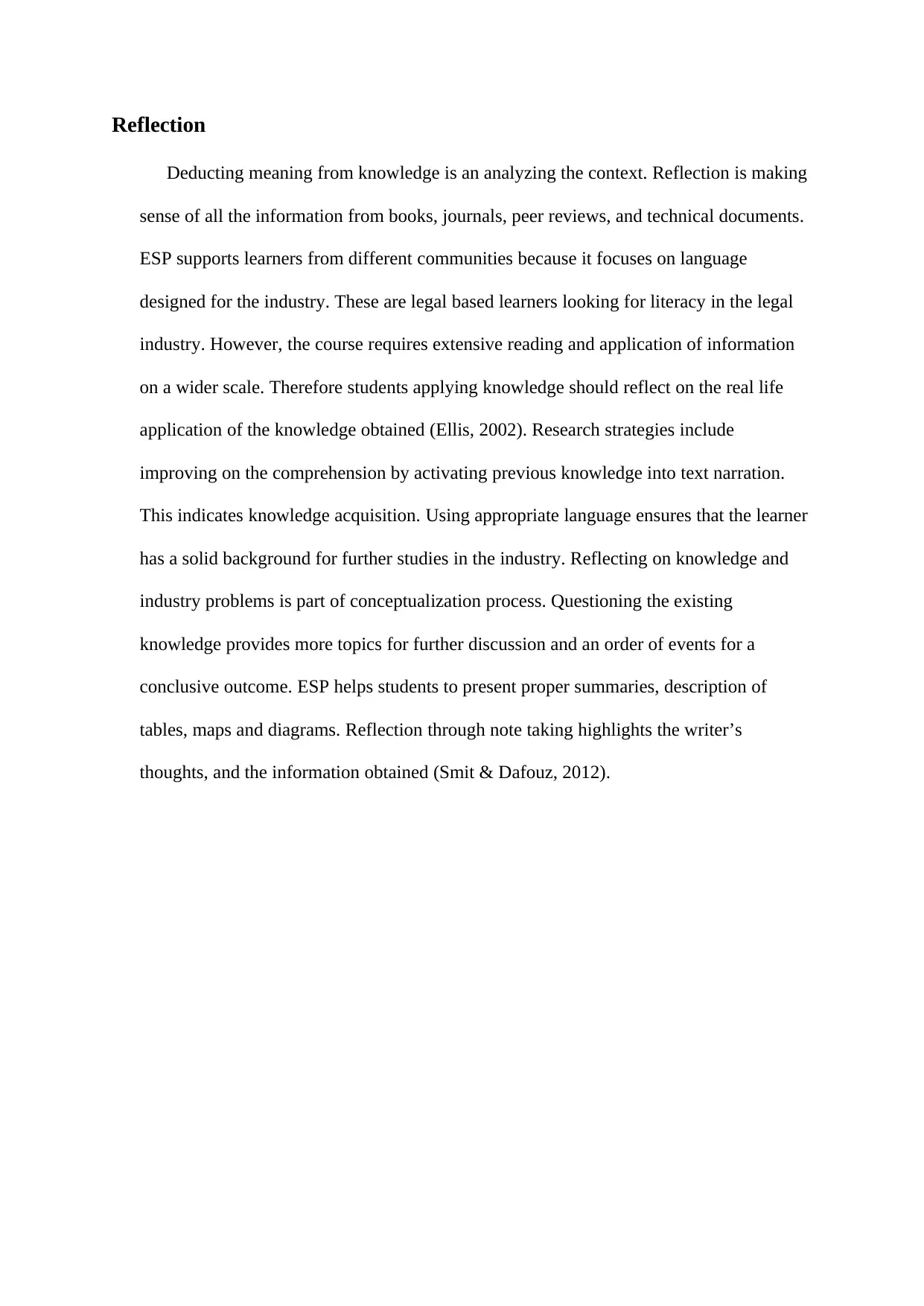
Reflection
Deducting meaning from knowledge is an analyzing the context. Reflection is making
sense of all the information from books, journals, peer reviews, and technical documents.
ESP supports learners from different communities because it focuses on language
designed for the industry. These are legal based learners looking for literacy in the legal
industry. However, the course requires extensive reading and application of information
on a wider scale. Therefore students applying knowledge should reflect on the real life
application of the knowledge obtained (Ellis, 2002). Research strategies include
improving on the comprehension by activating previous knowledge into text narration.
This indicates knowledge acquisition. Using appropriate language ensures that the learner
has a solid background for further studies in the industry. Reflecting on knowledge and
industry problems is part of conceptualization process. Questioning the existing
knowledge provides more topics for further discussion and an order of events for a
conclusive outcome. ESP helps students to present proper summaries, description of
tables, maps and diagrams. Reflection through note taking highlights the writer’s
thoughts, and the information obtained (Smit & Dafouz, 2012).
Deducting meaning from knowledge is an analyzing the context. Reflection is making
sense of all the information from books, journals, peer reviews, and technical documents.
ESP supports learners from different communities because it focuses on language
designed for the industry. These are legal based learners looking for literacy in the legal
industry. However, the course requires extensive reading and application of information
on a wider scale. Therefore students applying knowledge should reflect on the real life
application of the knowledge obtained (Ellis, 2002). Research strategies include
improving on the comprehension by activating previous knowledge into text narration.
This indicates knowledge acquisition. Using appropriate language ensures that the learner
has a solid background for further studies in the industry. Reflecting on knowledge and
industry problems is part of conceptualization process. Questioning the existing
knowledge provides more topics for further discussion and an order of events for a
conclusive outcome. ESP helps students to present proper summaries, description of
tables, maps and diagrams. Reflection through note taking highlights the writer’s
thoughts, and the information obtained (Smit & Dafouz, 2012).
Paraphrase This Document
Need a fresh take? Get an instant paraphrase of this document with our AI Paraphraser
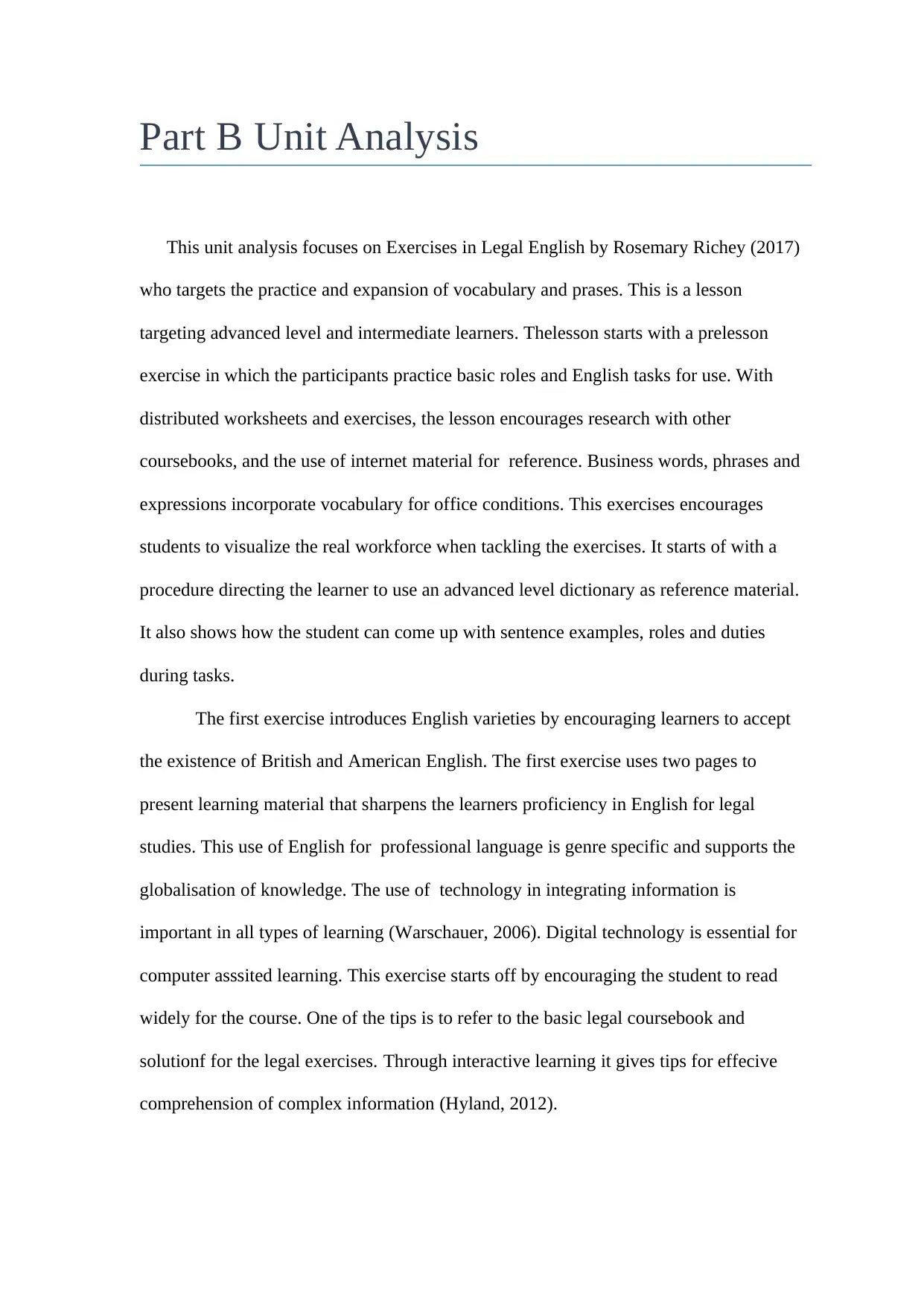
Part B Unit Analysis
This unit analysis focuses on Exercises in Legal English by Rosemary Richey (2017)
who targets the practice and expansion of vocabulary and prases. This is a lesson
targeting advanced level and intermediate learners. Thelesson starts with a prelesson
exercise in which the participants practice basic roles and English tasks for use. With
distributed worksheets and exercises, the lesson encourages research with other
coursebooks, and the use of internet material for reference. Business words, phrases and
expressions incorporate vocabulary for office conditions. This exercises encourages
students to visualize the real workforce when tackling the exercises. It starts of with a
procedure directing the learner to use an advanced level dictionary as reference material.
It also shows how the student can come up with sentence examples, roles and duties
during tasks.
The first exercise introduces English varieties by encouraging learners to accept
the existence of British and American English. The first exercise uses two pages to
present learning material that sharpens the learners proficiency in English for legal
studies. This use of English for professional language is genre specific and supports the
globalisation of knowledge. The use of technology in integrating information is
important in all types of learning (Warschauer, 2006). Digital technology is essential for
computer asssited learning. This exercise starts off by encouraging the student to read
widely for the course. One of the tips is to refer to the basic legal coursebook and
solutionf for the legal exercises. Through interactive learning it gives tips for effecive
comprehension of complex information (Hyland, 2012).
This unit analysis focuses on Exercises in Legal English by Rosemary Richey (2017)
who targets the practice and expansion of vocabulary and prases. This is a lesson
targeting advanced level and intermediate learners. Thelesson starts with a prelesson
exercise in which the participants practice basic roles and English tasks for use. With
distributed worksheets and exercises, the lesson encourages research with other
coursebooks, and the use of internet material for reference. Business words, phrases and
expressions incorporate vocabulary for office conditions. This exercises encourages
students to visualize the real workforce when tackling the exercises. It starts of with a
procedure directing the learner to use an advanced level dictionary as reference material.
It also shows how the student can come up with sentence examples, roles and duties
during tasks.
The first exercise introduces English varieties by encouraging learners to accept
the existence of British and American English. The first exercise uses two pages to
present learning material that sharpens the learners proficiency in English for legal
studies. This use of English for professional language is genre specific and supports the
globalisation of knowledge. The use of technology in integrating information is
important in all types of learning (Warschauer, 2006). Digital technology is essential for
computer asssited learning. This exercise starts off by encouraging the student to read
widely for the course. One of the tips is to refer to the basic legal coursebook and
solutionf for the legal exercises. Through interactive learning it gives tips for effecive
comprehension of complex information (Hyland, 2012).
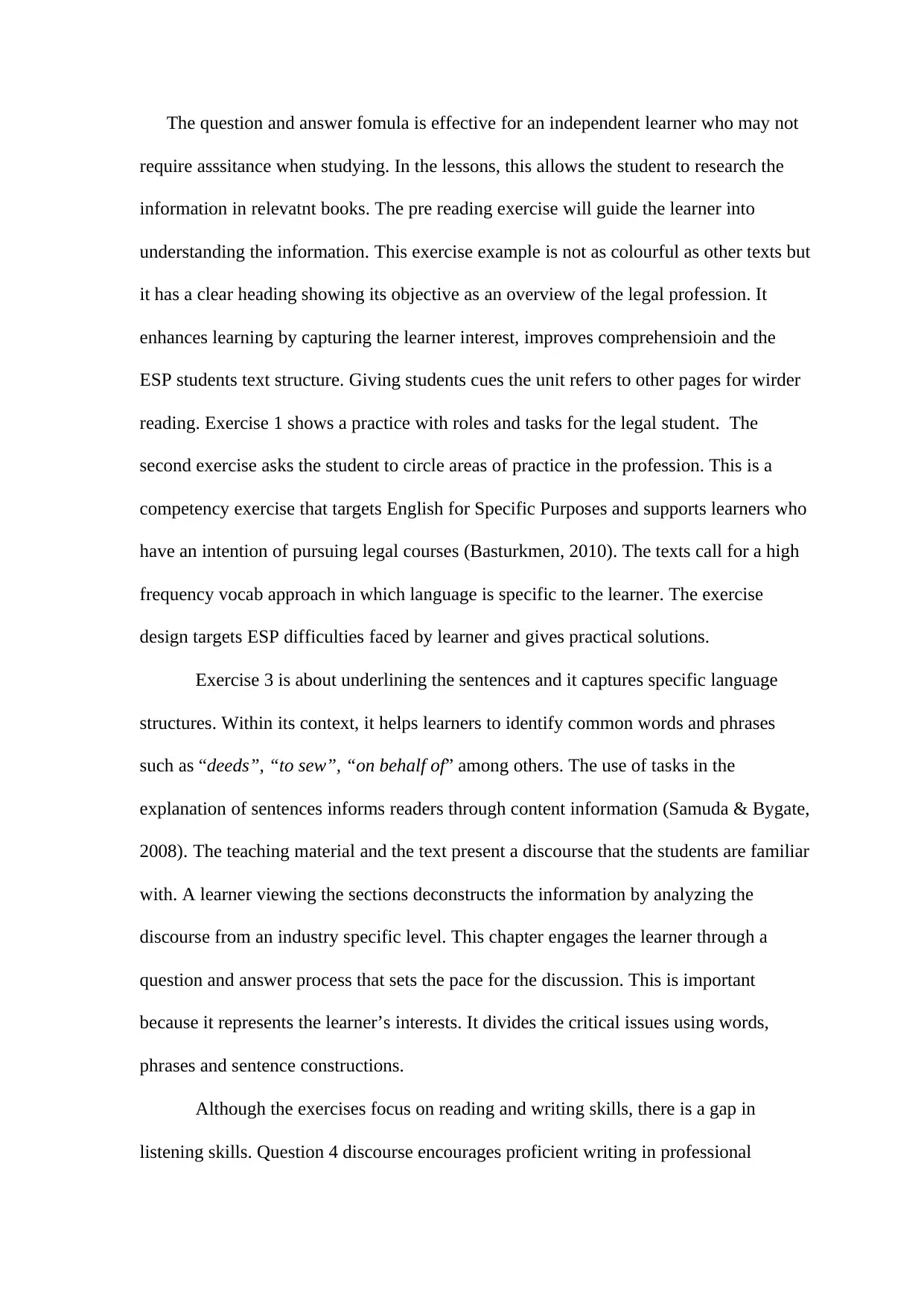
The question and answer fomula is effective for an independent learner who may not
require asssitance when studying. In the lessons, this allows the student to research the
information in relevatnt books. The pre reading exercise will guide the learner into
understanding the information. This exercise example is not as colourful as other texts but
it has a clear heading showing its objective as an overview of the legal profession. It
enhances learning by capturing the learner interest, improves comprehensioin and the
ESP students text structure. Giving students cues the unit refers to other pages for wirder
reading. Exercise 1 shows a practice with roles and tasks for the legal student. The
second exercise asks the student to circle areas of practice in the profession. This is a
competency exercise that targets English for Specific Purposes and supports learners who
have an intention of pursuing legal courses (Basturkmen, 2010). The texts call for a high
frequency vocab approach in which language is specific to the learner. The exercise
design targets ESP difficulties faced by learner and gives practical solutions.
Exercise 3 is about underlining the sentences and it captures specific language
structures. Within its context, it helps learners to identify common words and phrases
such as “deeds”, “to sew”, “on behalf of” among others. The use of tasks in the
explanation of sentences informs readers through content information (Samuda & Bygate,
2008). The teaching material and the text present a discourse that the students are familiar
with. A learner viewing the sections deconstructs the information by analyzing the
discourse from an industry specific level. This chapter engages the learner through a
question and answer process that sets the pace for the discussion. This is important
because it represents the learner’s interests. It divides the critical issues using words,
phrases and sentence constructions.
Although the exercises focus on reading and writing skills, there is a gap in
listening skills. Question 4 discourse encourages proficient writing in professional
require asssitance when studying. In the lessons, this allows the student to research the
information in relevatnt books. The pre reading exercise will guide the learner into
understanding the information. This exercise example is not as colourful as other texts but
it has a clear heading showing its objective as an overview of the legal profession. It
enhances learning by capturing the learner interest, improves comprehensioin and the
ESP students text structure. Giving students cues the unit refers to other pages for wirder
reading. Exercise 1 shows a practice with roles and tasks for the legal student. The
second exercise asks the student to circle areas of practice in the profession. This is a
competency exercise that targets English for Specific Purposes and supports learners who
have an intention of pursuing legal courses (Basturkmen, 2010). The texts call for a high
frequency vocab approach in which language is specific to the learner. The exercise
design targets ESP difficulties faced by learner and gives practical solutions.
Exercise 3 is about underlining the sentences and it captures specific language
structures. Within its context, it helps learners to identify common words and phrases
such as “deeds”, “to sew”, “on behalf of” among others. The use of tasks in the
explanation of sentences informs readers through content information (Samuda & Bygate,
2008). The teaching material and the text present a discourse that the students are familiar
with. A learner viewing the sections deconstructs the information by analyzing the
discourse from an industry specific level. This chapter engages the learner through a
question and answer process that sets the pace for the discussion. This is important
because it represents the learner’s interests. It divides the critical issues using words,
phrases and sentence constructions.
Although the exercises focus on reading and writing skills, there is a gap in
listening skills. Question 4 discourse encourages proficient writing in professional
⊘ This is a preview!⊘
Do you want full access?
Subscribe today to unlock all pages.

Trusted by 1+ million students worldwide
1 out of 19
Related Documents
Your All-in-One AI-Powered Toolkit for Academic Success.
+13062052269
info@desklib.com
Available 24*7 on WhatsApp / Email
![[object Object]](/_next/static/media/star-bottom.7253800d.svg)
Unlock your academic potential
Copyright © 2020–2026 A2Z Services. All Rights Reserved. Developed and managed by ZUCOL.





